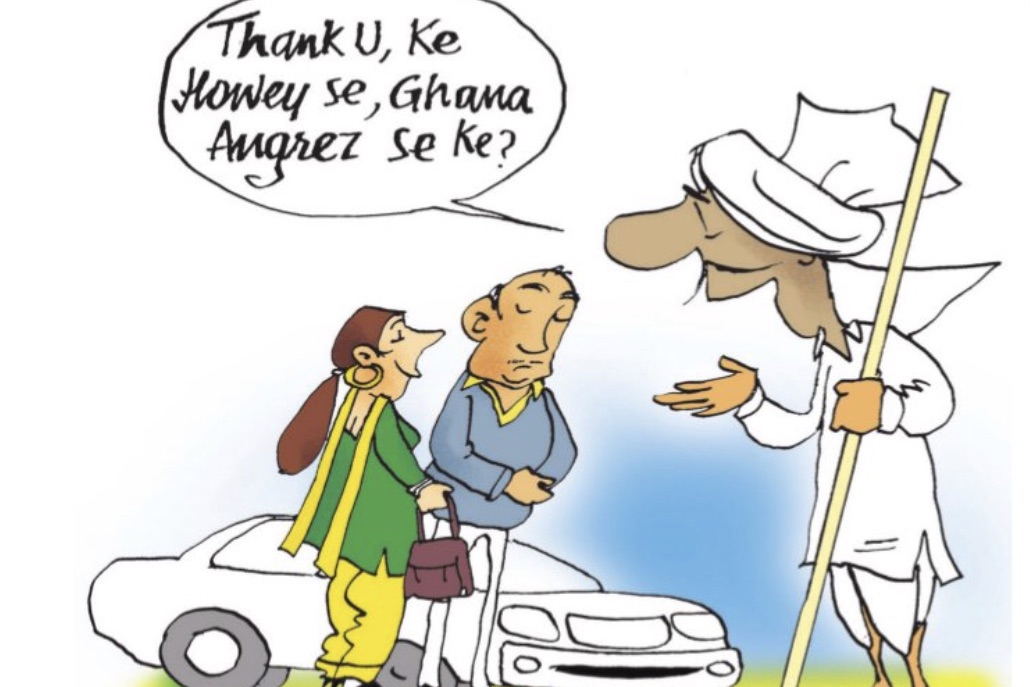
At a conference recently I called up my husband for some errand. More used to the somewhat dry and matter of fact “Haan bolo” ( yes, speak) I was completely taken aback by the bright and sunny “ Hello ji” at the other end. My mind raced as I tried to figure out what had changed in the intervening hours since I had left home. And then I realised that I was using my friend’s phone as mine had a network problem. “ Mein hoon!” ( it’s me!) I said, a little sarcastically, revealing my identity. Without missing a beat and ably hiding his embarrassment he responded, “Haan bolo.”
For those who didn’t get the joke, let me elaborate. Like most married couples we think that a secure relationship gives us the freedom to do away with the pleasantries and bare our fangs. We have been together long enough to consider niceties a needless formality, a feeling which is further exemplified by our location. Although I wasn’t born as one, I have become a Haryanvi, gradually, overtime. And like any true blue native I take pride in saying what I mean and meaning what I say. I like to get straight to the matter without mincing words. The small talk, the pleasantries, a prelude to any civilised conversation seems pointless.
Surprisingly, we reserve such behaviour for the overly familiar and the unfamiliar. For various reasons we Indians, particularly North Indians and peculiarly Haryanvis are distrustful of strangers. We don’t look at them, we don’t smile at them and we certainly don’t greet them. To the rest of the world this undue caution forms the basis of what is mistaken as our trademark haughtiness and rudeness.
On my overseas jaunts I have always found their little courtesies artificial. The “how are you doing, have a great day, nice sun today, enjoy the weather, stay safe, have a nice weekend, etc “ seem meaningless coming from complete strangers. I have felt that most of these wishes are mechanical with no feelings involved, some are superficial accompanied with smiles that don’t reach the eyes, only in a few the genuineness comes across.
I started doubting my stance after a recent conversation with a friend. A pedigreed Haryanvi he ‘converted’ when he visited San Diego for a short term fellowship. Initially wary of the niceties floating around, he noticed that these seemingly inconsequential greetings spiked up the entire environment. He started feeling more upbeat and happy. After some days he was uttering these “niceties” too, and emphasises that on many occasions his eyes did light up while delivering them. He has since realised that feeling a feeling is not enough, communication is paramount, whether it is love, gratitude or greetings.
Back from a road trip to Rajasthan where the musical “ Padharo mhare desh” reverberates from every nook and corner and Gujarat where “ Kem chho ?” is not a question but an affirmation I have been thinking. Are we, in our misplaced notion of being forthright and straightforward missing out on social etiquette? Is a fake smile worse than a sullen face? Isn’t a insincere greeting better than no greeting at all? And lastly, can we alter this behaviour which is ingrained in our persona ? Ordinary questions….but worth pondering.
The problem is if you are drilled to not interact with strangers as a kid it is difficult to suddenly change when you attain adulthood. Historians blame our suspicious attitude on the loot and plunder that our ancestors endured as foreign invaders made their way to Delhi. But isn’t it time to let bygones be bygones and ask a perfect stranger “Sab raaji khushi ?” ( All is well, I hope?) It isn’t totally risk free though, for he may respond with a “Ghana angrez se ke?” which is a rhetorical question reprimanding someone for being too anglicised!
( published in the Tribune in my column ‘ So Ordinary’ on 24/2/18)
This is not an absolute truth Manju. Haryanvis are also known for their crude sense of humour. Do you remember the saying which goes for Lord Hanuman that he was a Haryanvi( read JAT). Kissi ke lugai ,kissi ne Thai, Hanuman ne apni poonch jalwai. They poke their nose every where.
And saying RamRam to everyone is a tradition in villages of haryana.
You are right Sunita…Ram Ram is a Haryanvi tradition….but somehow North Indians ( specifically Haryanvis) have been labelled the rudest amongst the lot…in various studies on human behaviour
Great one,I still personally feel being English is actually being Royal…..choice lies in us,good read…..me still in Royal Navy era,nicesseties are good for self esteem too….,also the tone.. .if not the words…. nonetheless haryanvi and Punjabi adds spice to our culture,just like ginger and garlic…..
The Royal Navy era….nice one….and I agree niceties are necessities….the sooner we figure that out..the better it will be for everyone.
it might be haryanvis in particular but we ppl are reluctant to express our emotions or even exchange a smile !this ‘arrogance’ has worsened over the years!!
You are right Ritu…we are reluctant ‘expressers ‘ of emotion….and we are getting worse
Your writing has matured enough to pen down and expand your thoughts on any subject.
Thank you so much sir….it means a lot coming from you……you were there when I was just losing slippers and dogs